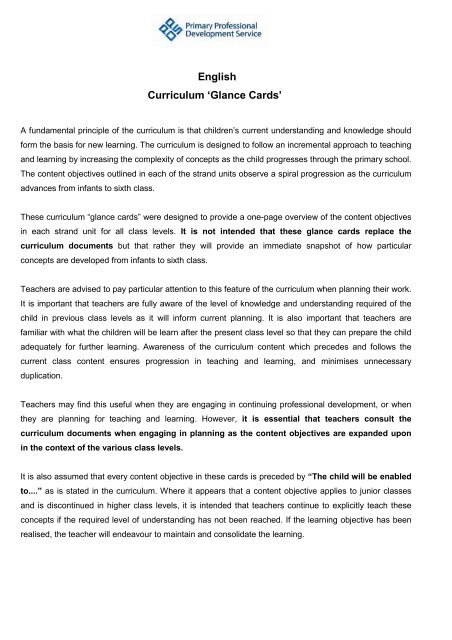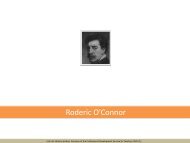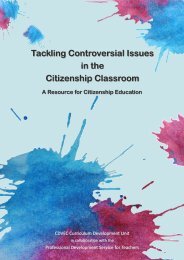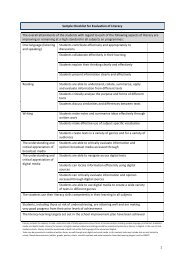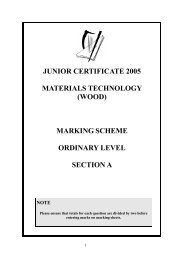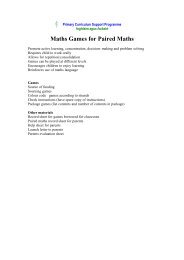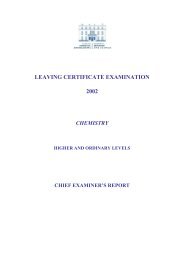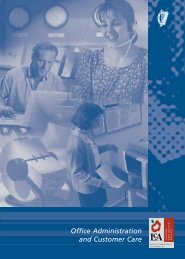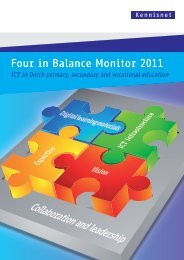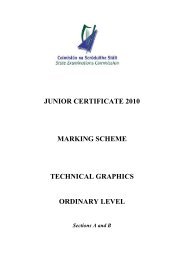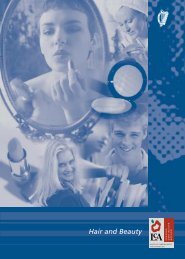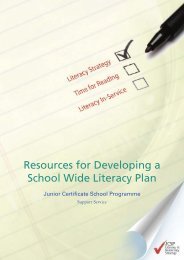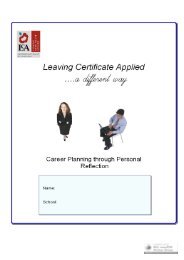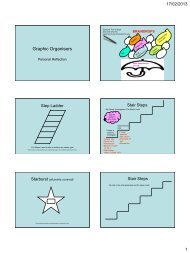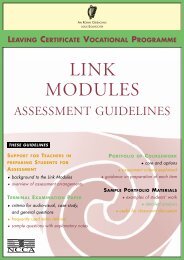English Curriculum 'Glance Cards' - PDST
English Curriculum 'Glance Cards' - PDST
English Curriculum 'Glance Cards' - PDST
You also want an ePaper? Increase the reach of your titles
YUMPU automatically turns print PDFs into web optimized ePapers that Google loves.
<strong>English</strong><br />
<strong>Curriculum</strong> ‘Glance Cards’<br />
A fundamental principle of the curriculum is that children’s current understanding and knowledge should<br />
form the basis for new learning. The curriculum is designed to follow an incremental approach to teaching<br />
and learning by increasing the complexity of concepts as the child progresses through the primary school.<br />
The content objectives outlined in each of the strand units observe a spiral progression as the curriculum<br />
advances from infants to sixth class.<br />
These curriculum “glance cards” were designed to provide a one-page overview of the content objectives<br />
in each strand unit for all class levels. It is not intended that these glance cards replace the<br />
curriculum documents but that rather they will provide an immediate snapshot of how particular<br />
concepts are developed from infants to sixth class.<br />
Teachers are advised to pay particular attention to this feature of the curriculum when planning their work.<br />
It is important that teachers are fully aware of the level of knowledge and understanding required of the<br />
child in previous class levels as it will inform current planning. It is also important that teachers are<br />
familiar with what the children will be learn after the present class level so that they can prepare the child<br />
adequately for further learning. Awareness of the curriculum content which precedes and follows the<br />
current class content ensures progression in teaching and learning, and minimises unnecessary<br />
duplication.<br />
Teachers may find this useful when they are engaging in continuing professional development, or when<br />
they are planning for teaching and learning. However, it is essential that teachers consult the<br />
curriculum documents when engaging in planning as the content objectives are expanded upon<br />
in the context of the various class levels.<br />
It is also assumed that every content objective in these cards is preceded by “The child will be enabled<br />
to....” as is stated in the curriculum. Where it appears that a content objective applies to junior classes<br />
and is discontinued in higher class levels, it is intended that teachers continue to explicitly teach these<br />
concepts if the required level of understanding has not been reached. If the learning objective has been<br />
realised, the teacher will endeavour to maintain and consolidate the learning.
Strand: Oral Language Strand unit: Developing receptiveness to oral language<br />
Infants First and second Third and fourth Fifth and sixth<br />
Experience, recognise and<br />
observe simple commands<br />
Listen to a story or<br />
description and respond to it<br />
Listen to stories,<br />
descriptions, instructions and<br />
directions and respond to<br />
them<br />
Give and follow instructions on<br />
how to perform a particular task or<br />
process<br />
Listen to, retell and tape a<br />
narrative or a description, taking<br />
turns giving the account<br />
Follow detailed instructions or directions from<br />
others in order to test their accuracy<br />
Take part in games in which unseen objects are<br />
identified from descriptions given by other pupils<br />
Listen to expressions, reactions, opinions and<br />
interpretations and retell or summarise them<br />
Listen to radio broadcasts and discuss what has<br />
been learned<br />
Listen to authors reading and discussing their<br />
own work<br />
Hear, repeat and elaborate<br />
words, phrases and<br />
sentences modelled by the<br />
teacher<br />
Use and interpret tone of<br />
voice expressing varying<br />
emotions<br />
Learn to adapt appropriate<br />
verbal and non-verbal<br />
behaviour to secure and<br />
maintain the attention of a<br />
partner<br />
Mime and interpret gesture,<br />
movement and attitude<br />
conveying various emotions<br />
Listen to sounds and<br />
respond to them<br />
Experience challenging<br />
vocabulary and sentence<br />
structure from the teacher<br />
Use gesture and movement<br />
to extend the meaning of<br />
what he/she is saying<br />
Becoming more adept in<br />
using appropriate verbal and<br />
non-verbal behaviour in<br />
order to secure and maintain<br />
the attention of the listener<br />
Express in mime various<br />
emotions and reactions, and<br />
interpret the emotions and<br />
reactions of others<br />
Discuss the use and effect of<br />
music, sound effects and nonverbal<br />
clues in audio tapes, video<br />
tapes and film clips<br />
Experience the teacher’s use of<br />
challenging vocabulary and<br />
sentence structure<br />
Use mime to convey ideas,<br />
reactions, emotions, desires and<br />
attitudes<br />
Become increasingly aware of the<br />
importance of gesture, facial<br />
expression, tone of voice,<br />
audibility and clarity of enunciation<br />
in communicating with others<br />
Listen to sound tapes or watch videos and films<br />
and discuss how sound effects enhance the<br />
content<br />
Experience from the teacher a growing<br />
elaboration and sophistication in the use of<br />
vocabulary and sentence structure<br />
Use mime to convey ideas, reactions, emotions,<br />
desires and attitudes<br />
Be continually aware of the importance of<br />
gesture, facial expression, audibility and clarity of<br />
enunciation in communicating with others<br />
Interpret mood, attitude, emotion and<br />
atmosphere in video extracts, advertisements,<br />
paintings and photographs
Strand: Oral Language Strand unit: Confidence and competence in using language<br />
Infants First and second Third and fourth Fifth and sixth<br />
Talk about past and present<br />
experiences, and plan, predict<br />
and speculate about future<br />
and imaginary experiences<br />
Use language to perform<br />
common social functions<br />
Initiate and sustain a<br />
conversation on a particular<br />
topic<br />
Combine simple sentences<br />
through the use of connecting<br />
words<br />
Experiment with descriptive<br />
words to add elaborative<br />
detail<br />
Talk about and reflect on<br />
past and present<br />
experiences, and plan,<br />
predict, anticipate and<br />
speculate about future and<br />
imaginary experiences<br />
Engage in real and<br />
imaginary situations to<br />
perform different social<br />
functions<br />
Initiate discussions, respond<br />
to the initiatives of others,<br />
and have practice in taking<br />
turns<br />
Focus on the subject under<br />
discussion and sustain a<br />
conversation on it<br />
Experiment with word order<br />
and examine its implications<br />
for meaning and clarity<br />
Experiment with more<br />
elaborate vocabulary and<br />
sentence structure in order<br />
to extend and explore<br />
meaning<br />
Summarise and prioritise ideas<br />
Practice the common social functions in<br />
the everyday context of class and<br />
school and through improvisational<br />
drama<br />
Initiate conversations and respond to<br />
the initiatives of others in talking about<br />
experiences and activities<br />
Give and take turns in speaking and<br />
experience a classroom environment in<br />
which tolerance for the views of others<br />
is fostered<br />
Present ideas that are relevant to the<br />
subject in a logical sequence<br />
Make lists of local expressions and<br />
words<br />
Play synonym and antonym games<br />
Practise and use improvisational drama to<br />
acquire a facility in performing more<br />
elaborate social functions.<br />
Converse freely and confidently on a<br />
range of topics<br />
Give and take turns in an environment<br />
where tolerance for the views of others is<br />
fostered<br />
Acquire the ability to give detailed<br />
instructions and directions<br />
Explore the possibilities of language and<br />
sentence structure in expressing<br />
increasingly complex thoughts<br />
Discuss the meaning, effect and diversity<br />
of local words and expressions<br />
Discuss the positive and negative effects<br />
of jargon, slang and cliché, and express<br />
examples of them in his/her own<br />
language
Choose appropriate words to<br />
name and describe things and<br />
events<br />
Hear, discuss and react to local<br />
storytellers<br />
Use improvisational drama to re-create<br />
well-known characters<br />
Become aware of new words and new<br />
connotations of words through his/her<br />
reading and writing experience<br />
Discuss the meanings and origins of<br />
words, phrases and expressions with<br />
the teacher<br />
Become familiar with the functions<br />
without necessarily using technical<br />
grammatical terms<br />
Hear accents and dialects other than<br />
his/her own on tape and on video and<br />
discuss them<br />
Use improvisational drama to learn how<br />
local idiom, accent and dialect can<br />
influence the effect of language in<br />
particular situations<br />
Become familiar with compound and<br />
complex sentences and know and<br />
understand the terms ‘phrase’ and<br />
‘clause’<br />
Understand the functions and know the<br />
names of the parts of speech<br />
Learn about and name the basic<br />
properties of<br />
nouns and verbs
Strand: Oral language Strand unit: Developing cognitive abilities through oral language<br />
Infants First and second Third and fourth Fifth and sixth<br />
Provide further information in<br />
response to the teacher’s<br />
prompting<br />
Listen to a story or a narrative<br />
and ask questions about it<br />
Give a description, recount a<br />
narrative or describe a process,<br />
and answer questions about it<br />
Listen to other children describe<br />
experiences and ask questions<br />
about their reactions to them<br />
Discuss issues that directly affect<br />
his/her life<br />
Discuss a story being read and<br />
predict future events and likely<br />
outcomes in it<br />
Discuss ideas of major concern<br />
Discuss ideas and concepts<br />
encountered in other areas of<br />
the curriculum<br />
Show understanding of text<br />
Listen to a story or a narrative<br />
and ask questions about it<br />
Focus on descriptive detail and<br />
begin to be explicit in relation to<br />
people, places, times,<br />
processes, events, colour,<br />
shape, size, position<br />
Discuss different possible<br />
solutions to simple problems<br />
Ask questions in order to satisfy<br />
curiosity about the world<br />
Become increasingly explicit in<br />
relation to people, places, times,<br />
processes and events by adding<br />
elaborative detail to what he/she<br />
describes and narrates<br />
Ask questions that will satisfy<br />
his/her curiosity and wonder<br />
Discuss different possible<br />
solutions to problems<br />
Discuss causes and effects in<br />
relation to processes and events<br />
and predict possible outcomes<br />
Learn how to use the basic key<br />
questions<br />
Listen to a presentation and<br />
discuss and decide which are the<br />
most important questions to ask<br />
Discuss what he/she knows of a<br />
particular topic or process as a<br />
basis for encountering new<br />
problems<br />
Use a discussion of the familiar<br />
as the basis of a more formal or<br />
objective grasp of a topic or<br />
concept<br />
Use the basic key questions and<br />
checking questions as a means<br />
of extending knowledge<br />
Listen to a presentation on a<br />
particular topic, decide through<br />
discussions which are the most<br />
appropriate questions to ask,<br />
and then prioritise them<br />
Respond to arguments<br />
presented by the teacher.<br />
Discuss the value, truth or<br />
relevance of popular ideas,
Engage in real and imaginary<br />
situations involving language use<br />
Make presentations to the class<br />
about his/her own particular<br />
interests<br />
Justify personal likes and dislikes<br />
Argue a point of view and try to<br />
persuade others to support it<br />
Explore historical events through<br />
improvisational drama<br />
Explore reactions to ideas<br />
through improvisational drama<br />
causes and proverbs<br />
Argue points of view from the<br />
perspective of agreement and<br />
disagreement through informal<br />
discussion and in the context of<br />
formal debates<br />
Justify and defend particular<br />
opinions or attitudes and try to<br />
persuade others to support a<br />
particular point of view<br />
Explore historical contexts<br />
through improvisational drama<br />
Explore and express conflicts of<br />
opinion through improvisational<br />
drama
Strand: Oral language Strand unit: Developing emotional and imaginative life<br />
through oral language<br />
Infants First and second Third and fourth Fifth and sixth<br />
Reflect on and talk about a wide<br />
range of everyday experience and<br />
feelings<br />
Create and tell stories.<br />
Describe everyday<br />
experiences and events<br />
Express feelings in order to<br />
clarify them and explain them<br />
to others<br />
Tell stories to his/her own<br />
words and answer questions<br />
about them.<br />
Describe everyday experiences to<br />
the class or group and discuss them<br />
Express feelings and attitudes<br />
through improvisational drama<br />
Discuss favourite moments,<br />
important events and exciting<br />
characters in a story, play or poem<br />
Create and tell stories to the class or<br />
group and retell them after<br />
questioning, comparing the versions<br />
Discuss with others his/her reactions<br />
to everyday experiences and to<br />
local, national and world events<br />
Discuss the concerns of other<br />
children<br />
Discuss ideas, concepts and images<br />
encountered in literature<br />
Listen to, learn and retell a rich<br />
variety of stories, rhymes and<br />
songs<br />
Recognise and re-create sounds<br />
in the immediate environment<br />
Create real and imaginary sound<br />
worlds<br />
Use language to create and<br />
sustain imaginary situations in<br />
play<br />
Experiment with different voices<br />
in role-playing<br />
Listen to, learn and recite rhymes,<br />
including nonsense rhymes<br />
Re-create stories and poems<br />
in improvisational drama<br />
Recognise and re-create<br />
sounds in the environment<br />
Create real and imaginary<br />
sound worlds<br />
Use play and improvisational<br />
drama to sustain imaginary<br />
situations<br />
Use imaginative play to create<br />
humorous characters and<br />
situations<br />
Listen to and say nonsense<br />
words and unusual words<br />
Listen to, read, learn and recite<br />
more sophisticated nonsense<br />
Express reactions to events and<br />
characters in stories<br />
Dramatise stories.<br />
Create and sustain imaginary<br />
contexts through improvisational<br />
drama<br />
React to poems through<br />
improvisational drama<br />
Experience and enjoy playful<br />
aspects of language<br />
Discuss personal reading and writing<br />
Discuss plays, films and television<br />
programmes<br />
Experience and enjoy playful<br />
aspects of language
verse and rhymes<br />
Listen to, learn and ask riddles<br />
Clap the rhythms of poems<br />
and rhymes<br />
Listen to, learn and tell riddles<br />
and jokes<br />
Respond through discussion,<br />
mime and role-playing to stories,<br />
rhymes and songs heard and<br />
learnt<br />
Listen to, read, learn and recite<br />
a varied and appropriate<br />
repertoire of rhymes and<br />
poems<br />
Discuss reactions to poems<br />
Express individual responses to<br />
poems and literature and discuss<br />
different interpretations
Strand: Reading Strand unit: Receptiveness to language<br />
Infants First and second Third and fourth Fifth and sixth<br />
Listen to, enjoy and respond to<br />
stories, nursery rhymes, poems and<br />
songs<br />
Become an active listener through<br />
the development of a range of<br />
listening activities based on stories<br />
read or told<br />
Read texts created by<br />
himself/herself and by other children<br />
in collaboration with the teacher<br />
Become familiar with a wide range<br />
of environmental print, beginning<br />
with print in the classroom<br />
Learn about the basic terminology<br />
and conventions of books<br />
Play with language to develop an<br />
awareness of sounds<br />
Develop a sense of rhythm and<br />
rhyme<br />
Learn to recognise and name the<br />
letters of the alphabet<br />
Develop an awareness of some<br />
letter-sound relationships<br />
Continue to experience the reading process<br />
being modelled<br />
Engage in shared reading activities<br />
Visit the school library and the local library<br />
Engage in activities designed to increase<br />
awareness of sounds<br />
Learn about the sounds associated with the<br />
part of a word or syllable that allows it to<br />
rhyme with another word or syllable.<br />
Learn about the sounds associated with the<br />
beginning of a word or syllable<br />
Learn to connect the beginnings of words or<br />
syllables with their rhyming parts as an<br />
auditory and visual exercise<br />
Learn about common word endings, word<br />
families and roots of words<br />
Refine his/her listening skills<br />
through hearing the teacher read<br />
aloud<br />
Identify unfamiliar words by<br />
reference to word parts, prefixes<br />
and suffixes
Use knowledge of letter-sound relationships,<br />
grammar and syntax and surrounding text<br />
when attempting to identify unfamiliar words<br />
Continue to build a sight vocabulary of<br />
common words from books read and from<br />
personal experience<br />
Self-correct reading errors when what he/she<br />
reads does not make sense<br />
Develop reading skills through engaging with<br />
reading material appropriate to his/her stage<br />
of development<br />
Adapt his/her reading style for different<br />
purposes<br />
Use more than one strategy when<br />
reading unfamiliar text<br />
Continue to self-correct reading<br />
errors<br />
Understand the relationship<br />
between text and illustration<br />
Become an increasingly<br />
independent reader<br />
Improve his/her ability<br />
to recognise and<br />
understand words by<br />
using root words,<br />
prefixes, suffixes, and<br />
syllabication<br />
Achieve proficiency in<br />
word identification by<br />
refining the different<br />
word identification skills<br />
Engage with an<br />
increasing range of<br />
narrative, expository<br />
and representational<br />
text<br />
Become self-reliant,<br />
confident, independent<br />
readers, having time in<br />
class for sustained<br />
silent reading
Strand: Reading Strand unit: Confidence and competence<br />
Infants First and second Third and fourth Fifth and sixth<br />
Experience the reading process<br />
being modelled<br />
Handle books and browse through<br />
them<br />
Encounter early reading through<br />
collaborative reading of large-format<br />
books and language-experience<br />
material<br />
Engage in shared reading activities<br />
Build up a sight vocabulary of<br />
common words from personal<br />
experience, from experience of<br />
environmental print and from books<br />
read<br />
Learn to isolate the beginning sound<br />
of a word or syllable<br />
Learn to isolate beginning and final<br />
sounds in written words<br />
Learn to find books in a<br />
classroom or school library<br />
Read aloud to share a text<br />
with an audience<br />
Read from a range of<br />
children’s literature, choosing<br />
material for reading during<br />
silent reading periods<br />
.<br />
Have access to a plentiful<br />
supply of books in the<br />
classroom and in the school<br />
library<br />
Use library facilities outside<br />
the school<br />
Experience different types of<br />
text<br />
Engage with a wide variety of<br />
poetry and verse on a regular<br />
basis<br />
Participate in organised visits to the public<br />
library and avail of the mobile library<br />
service<br />
Engage in books in group or in wholeclass<br />
settings<br />
Read widely as an independent reader<br />
from a more challenging range of reading<br />
material, including stories, poems, myths,<br />
legends, novels and non-fiction texts<br />
appropriate to his/her age and reading<br />
ability<br />
Learn about the structure and appreciate<br />
the function of the component parts of a<br />
newspaper
Learn to isolate the part of a word or<br />
a syllable which allows it to rhyme<br />
with another word or syllable<br />
Use knowledge of word order,<br />
illustration, context and initial letters<br />
to identify unknown words<br />
Find information and share it<br />
with others<br />
Perform simple information<br />
retrieval tasks<br />
Engage in personal reading<br />
Use simple dictionaries<br />
effectively<br />
Develop basic information<br />
retrieval skills<br />
Select personal reading<br />
material and develop personal<br />
taste in reading for pleasure<br />
and information<br />
Read to satisfy personal interests
Strand: Reading Strand unit: Developing cognitive abilities<br />
Infants First and second Third and fourth Fifth and sixth<br />
Differentiate between text and<br />
pictures.<br />
Analyse and interpret<br />
characters, situations, events<br />
and sequences presented<br />
pictorially<br />
Predict future incidents and<br />
outcomes in stories<br />
Re-read, retell and act out<br />
familiar stories, poems or parts<br />
of stories<br />
Develop comprehension<br />
strategies<br />
Predict future events and<br />
outcomes in a book that is being<br />
read aloud<br />
Pursue individual interests<br />
through independent reading of<br />
fiction and non-fiction<br />
Continue to develop a range of<br />
comprehension strategies to deal<br />
with narrative, expository and<br />
representational reading material<br />
Use a knowledge of printing<br />
conventions as an aid to expression<br />
and comprehension<br />
Explore new interests and<br />
perspectives through reading<br />
Know the structure and terminology<br />
of books<br />
Understand the function of text Perform alphabetical order tasks Develop skills in locating and<br />
handling books through using wellstocked<br />
school and classroom<br />
libraries<br />
Read short books in one sitting to<br />
experience success in reading<br />
Read books independently<br />
Use information technology to<br />
increase motivation to read and to<br />
enhance reading development<br />
Continue to use information<br />
technology to increase motivation to<br />
read and to enhance reading<br />
development<br />
Use comprehension skills such as analysing,<br />
confirming, evaluating, synthesising and correlating<br />
to aid deduction, problem solving and prediction<br />
Develop study skills such as skimming, scanning,<br />
note-taking and summarising<br />
Listen to, read, learn, recite and respond to a<br />
challenging range of poetry<br />
Read and interpret different kinds of functional text<br />
Explore appropriate non-fiction texts for various<br />
purposes.<br />
Have access to a wide range of reading material in<br />
the classroom and/or school a library<br />
Use the school, classroom and public libraries to<br />
develop greater insight into book location,<br />
classification and organisation
Recall and talk about<br />
significant events and details<br />
in stories<br />
Adopt an active approach to a<br />
text by posing his/her own<br />
questions<br />
Extend participation in listening and<br />
silent reading activities.<br />
Give recommendations to and<br />
receive recommendations from<br />
the wider community of readers<br />
on the choice of reading material<br />
Express a more formal response<br />
by giving a considered personal<br />
opinion of a book in oral or in<br />
written form<br />
Seek recommendations for books to<br />
read and recommend books to<br />
others<br />
Keep a record of his /her reading in<br />
various forms<br />
Support arguments and opinions with evidence from<br />
the text<br />
Distinguish between fact and opinion, and bias and<br />
objectivity, in text and in the media<br />
Retrieve and interpret information in a variety of<br />
ways<br />
Use information retrieval strategies in crosscurricular<br />
settings<br />
Find information relevant to his/her purpose in nonfiction<br />
texts, graphs and pictorial and diagrammatic<br />
data, and through the use of information technology<br />
Continue to keep a record of personal reading in<br />
various forms
Strand: Reading Strand unit: Developing emotional and imaginative life<br />
Infants First and second Third and fourth Fifth and sixth<br />
Associate print with<br />
enjoyment, through<br />
listening to stories and<br />
poems read aloud.<br />
Perceive reading as a<br />
shared, enjoyable<br />
experience.<br />
Respond to characters,<br />
situations and story<br />
details, relating them to<br />
personal experience.<br />
Pursue and develop<br />
individual interests<br />
through engagement<br />
with books.<br />
Record response to text<br />
through pictures and<br />
captions<br />
Continue to listen to and enjoy<br />
stories and poems being read<br />
aloud.<br />
Listen to entire stories read aloud<br />
in instalments.<br />
Experience enhanced levels of<br />
self-esteem through success in<br />
reading.<br />
Engage with a wide variety of text.<br />
Respond to characters and events<br />
in a story.<br />
Explore different attitudes and<br />
feelings by imagining what it would<br />
be like to be certain characters.<br />
Engage in spare-moment reading<br />
and browsing by having ready<br />
access to reading material.<br />
Engage frequently in informal<br />
discussion of books with teachers<br />
and others<br />
Experience a shared response to fiction<br />
through the use of a class novel.<br />
Recognise and discuss differences in<br />
reading tastes.<br />
Read aloud with expression.<br />
Extend and develop his/her response to<br />
increasingly challenging reading<br />
material.<br />
Engage in talk about books.<br />
Talk about choice of books and the<br />
reasons for choices.<br />
Share responses with other children<br />
and with adults to cultivate a community<br />
of readers<br />
Read aloud from a personal choice of<br />
texts to entertain and inform an<br />
audience.<br />
Listen to books or extracts from books<br />
and poetry read aloud or presented on<br />
tape, radio or television.<br />
Develop individuality as a reader by<br />
experiencing success and the<br />
enhancement of self-esteem through<br />
reading.<br />
Examine similarities and differences in<br />
various types of text.<br />
Appreciate issues in fiction<br />
Browse through, handle, discuss,<br />
recommend and select books for<br />
independent reading<br />
Relate personal experience to the ideas<br />
and emotions conveyed in the text<br />
Hear the teacher model a response to<br />
poems, fiction, plays and parts of plays<br />
Respond to poetry and fiction through<br />
discussion, writing, drama, the visual<br />
arts and dance.<br />
Continue to share response to an everincreasing<br />
variety of texts with the wider<br />
community of readers
Strand: Writing Strand unit: Receptiveness to Language<br />
Infants First and second Third and fourth Fifth and sixth<br />
Experience and enjoy a print-rich<br />
environment<br />
Receive help from the teacher, who<br />
will sometimes act as scribe to assist<br />
with accuracy and presentation<br />
Experience a classroom environment<br />
that encourages writing<br />
Observe the teacher as he/she models<br />
writing stories<br />
Seek help from the teacher in order to<br />
achieve accuracy and an appropriate<br />
standard presentation<br />
Experience a classroom<br />
environment that encourages<br />
writing<br />
Observe the teacher modelling<br />
different writing genres<br />
Use personal reading as a<br />
stimulus to writing<br />
Experience how a story structure is<br />
organised by reading and listening to<br />
fiction<br />
Write and draw frequently Explore different genres Write stories that explore a<br />
variety of genres<br />
Experience a classroom environment<br />
that encourages writing<br />
Observe the teacher model a wide<br />
variety of writing genres<br />
Express and communicate reactions to<br />
reading experiences<br />
Experience interesting and relevant<br />
writing challenges<br />
.<br />
Choose topics to write about<br />
Choose both the subject and<br />
form of his/her writing<br />
Read personal writing aloud and hear<br />
it read<br />
Work with other children when writing Receive and give positive<br />
responses to writing<br />
Receive and give constructive<br />
responses to writing<br />
Re-read his/her writing for<br />
pleasure<br />
Experience a level of success in writing<br />
that will be an incentive to continue<br />
writing<br />
Write for different audiences Write regularly for different audiences Choose the audience for which<br />
to write<br />
Write for an increasingly varied<br />
audience<br />
See personal writing displayed Have writing valued See his/her writing valued See his/her writing valued
Strand: Writing Strand unit: Developing confidence and competence and the ability to write<br />
independently<br />
Infants First and second Third and fourth Fifth and sixth<br />
Write and draw<br />
See the teacher model writing as an enjoyable<br />
experience<br />
Choose subjects for drawing and writing<br />
Experience an abundance of oral<br />
language activity when preparing<br />
a writing task<br />
Confer with the teacher and others on<br />
the quality of presentation<br />
Choose topics for writing after<br />
conferring with the teacher<br />
Have regular opportunities to write for<br />
himself/ herself or for others<br />
Experience varied and<br />
consistent oral language<br />
activity as a preparation for<br />
writing<br />
Give sequence to ideas and<br />
events in stories<br />
Regularly select his/ her<br />
own topics for writing<br />
Learn to use questions as a<br />
mechanism for expanding<br />
and developing a story<br />
Engage with the writing of<br />
one piece over a period<br />
Choose to write for himself /<br />
herself only<br />
Write regularly, and<br />
gradually extend the period<br />
over which a writing effort is<br />
sustained<br />
Co-operate in writing a<br />
record of class activities<br />
Experience varied and<br />
consistent oral language<br />
activity as part of the prewriting<br />
process<br />
Observe the teacher<br />
improving writing<br />
Write regularly on chosen<br />
topics<br />
.<br />
Write for a sustained length<br />
of time<br />
Engage in the writing of one<br />
piece over a period<br />
Write, without re-drafting,<br />
on a given or chosen topic<br />
within certain time<br />
constraints<br />
Take part in co-operative<br />
writing activities
Choose the form of expression he/she finds<br />
appropriate<br />
Write notes and messages to different<br />
audiences<br />
Realise that first attempts at writing are<br />
not necessarily the finished product and<br />
learn to undertake second drafts in<br />
order to improve writing<br />
Decide whether or not to re-draft a<br />
piece of writing<br />
Develop an awareness of<br />
the difference between<br />
written language and oral<br />
language<br />
Decide, after conferring with<br />
the teacher and others, who<br />
the audience for a piece of<br />
writing should be<br />
Decide on the quality of<br />
presentation in relation to<br />
the purpose and audience<br />
of a piece of writing<br />
Develop an appreciation of<br />
how the intended audience<br />
should influence the nature<br />
of a piece of writing<br />
Develop his / her ability to<br />
write using information<br />
technology<br />
Learn to revise and re-draft<br />
writing<br />
Learn to write with<br />
increasing grammatical<br />
accuracy through the<br />
process of revision and<br />
editing<br />
Develop a satisfactory grip of writing implements Write in a legible joined<br />
script with confidence and<br />
fluency<br />
Learn to form and name individual letters using<br />
various materials<br />
Understand the left-right, top-bottom orientation of<br />
writing<br />
Understand that the conventions of<br />
punctuation help to make meaning<br />
Learn to use a wider range<br />
of punctuation marks with<br />
Choose a register of<br />
language appropriate to<br />
subject and audience<br />
Choose a form and quality<br />
of presentation appropriate<br />
to the audience<br />
Write fluently and relevantly<br />
in other areas of the<br />
curriculum<br />
Develop skills in the use of<br />
information technology<br />
Write independently through<br />
a process of drafting,<br />
revising, editing and<br />
publishing<br />
Help others with editing<br />
their work<br />
Develop a legible, fluent,<br />
personal style of<br />
handwriting<br />
Explore the possibilities of<br />
syntax and sentence
Become aware of lower-case and capital letters and<br />
the full stop<br />
clearer in writing<br />
greater accuracy as part of<br />
the revision and editing<br />
process<br />
structure in reading and<br />
writing<br />
Copy words from signs in the environment<br />
Copy letters and words informally as part of class<br />
activities.<br />
Write his/her name<br />
Spell words in a recognisable way<br />
based on an awareness of the most<br />
common spelling strings and patterns<br />
Observe the conventions of<br />
grammar, punctuation and<br />
spelling in his/her writing<br />
Use labels to name familiar people or things<br />
Write letters and words from memory<br />
Develop the confidence to use approximate spelling<br />
Use approximate spelling as an interim<br />
measure in mastering the conventions<br />
of spelling<br />
Begin to develop conventional spelling of simple<br />
words<br />
Spell correctly a range of familiar,<br />
important and regularly occurring<br />
words, and use a variety of sources as<br />
aids to spelling<br />
Use a range of aids and<br />
strategies, including the use<br />
of approximate spelling, to<br />
improve his / her command<br />
of spelling<br />
Use dictionaries and<br />
thesauruses to extend and<br />
develop vocabulary and<br />
spelling
Strand: Writing Strand unit: Developing cognitive abilities<br />
Clarifying thought through language<br />
Infants First and second Third and fourth Fifth and sixth<br />
Draw a picture and write about it Write in a variety of genres Write in a variety of genres with greater<br />
sophistication<br />
Draw and write about everyday Write a version of a story told by Read a story and write it in his/ her own<br />
experience or about something the teacher<br />
words<br />
just learned<br />
Write about something that has Write about ideas encountered in other<br />
been learned<br />
areas of the curriculum<br />
Write answers to questions asked<br />
by the teacher<br />
Write naming words and add<br />
descriptive words<br />
Rewrite sentences to make the<br />
message clearer<br />
Listen to a story and write down<br />
questions to ask about it<br />
Write the significant details about<br />
an event or an activity<br />
Write an explanation for something<br />
Write a simple sentence and add<br />
words to it to extend its meaning<br />
Re-read work, confer with the<br />
teacher or others about it, and then<br />
rewrite it<br />
Write about an idea to explain it to<br />
someone else<br />
Read a narrative or expository piece<br />
and summarise it<br />
Write about why he/she finds an idea<br />
attractive<br />
Write down directions on how to<br />
perform a particular process<br />
Write a list of questions about a<br />
particular topic and prioritise them<br />
Write a sentence and elaborate on it by<br />
adding one or more ideas to it<br />
Expand and clarify his/her thoughts on<br />
a particular idea or topic through<br />
drafting and re-drafting<br />
Write in a wide variety of genres<br />
Express and communicate new learning<br />
Relate new ideas to previous learning<br />
Reflect on and analyse ideas through<br />
writing<br />
Write for a particular purpose and with a<br />
particular audience in mind<br />
Use notes to summarise reading material<br />
and write an account from the notes<br />
Argue the case in writing for a particular<br />
point of view<br />
Argue the case in writing for a point of<br />
view with which he/she disagrees<br />
Sketch an ordered summary of ideas and<br />
draft a writing assignment on it<br />
Examine the characteristics that<br />
differentiate written and oral language.<br />
Refine ideas and their expression<br />
through drafting and re-drafting<br />
Explore the use of compound and<br />
complex sentences in expressing<br />
thought
Strand: Writing Strand unit: Developing emotional and imaginative life through language<br />
Infants First and second Third and fourth Fifth and sixth<br />
Hear a rich variety of stories,<br />
rhymes and songs and write<br />
about them<br />
Draw and write about things<br />
he/she likes and dislikes<br />
Draw and write about sensory<br />
experiences<br />
Use mime and role-playing to<br />
create imaginary situations and<br />
then draw and write about<br />
them<br />
Listen to the experiences of others<br />
and express reactions to them in<br />
writing<br />
Write about experiences<br />
Draw and write about sensory<br />
experience<br />
Write about feelings experienced in<br />
drama activities<br />
Express his/her reactions to particular<br />
experiences in writing<br />
Write about experiences and feelings<br />
in diary form<br />
Write about feelings experienced in<br />
improvisational drama<br />
Express in writing his/her reactions to<br />
personal reading<br />
Draw and write about feelings Express feelings in writing Use his/her own artwork and that of<br />
Listen to music and write about it<br />
others as a stimulus to writing<br />
Express in writing reactions to the<br />
experiences of others<br />
Analyse in writing his/her reactions to<br />
personal experiences<br />
Keep a personal diary<br />
Write short plays based on activity in<br />
improvisational drama<br />
Express a personal reaction to ideas,<br />
emotions and images encountered in<br />
literature<br />
Express in writing reactions to music,<br />
artwork, films, television programmes and<br />
videos<br />
Draw and write stories Draw and write stories and poems Create stories and poems Write stories and poems<br />
Write extended stories in book form<br />
Express in writing likes and dislikes<br />
about events and characters in<br />
stories and poems<br />
Write about favourite moments,<br />
characters and events in stories<br />
Express in writing his/her reactions to<br />
poems<br />
Write longer stories or a series of related<br />
stories in book form<br />
Write about the relationship between poems<br />
and personal experience<br />
Express and analyse his/her reactions to<br />
poems<br />
Analyse different interpretations of poems in<br />
writing


